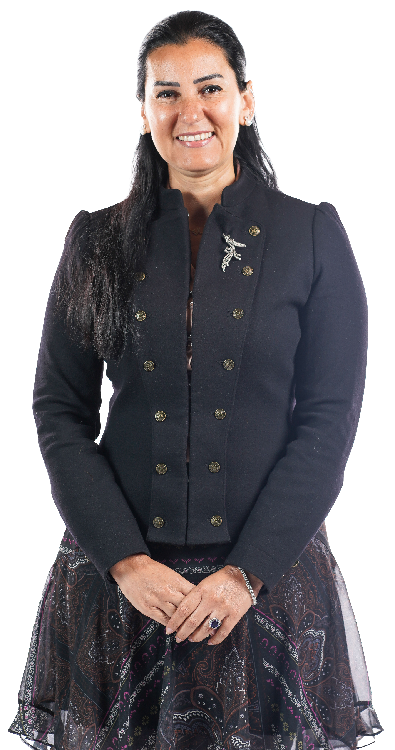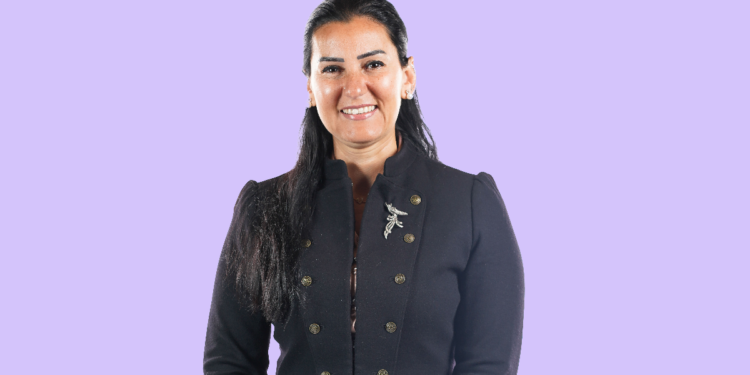Interview – Investing in Existing Clients A Milestone of IWAN’s Marketing Plan for 2021
Alia El-Nagdi, IWAN Head of Marketing and Public Relations interviewed by CMOs...
Given the tremble witnessed by the real estate sector in the first half of the last year due to the widespread Corona epidemic as sales declined by 50%. The Sector welcomed 2021 having great hopes for recovery, particularly with the availability of vaccines.
Since marketing is a major element on which the Sector relies to be recovered, especially as Ramadan season (the most important advertising milestone for many sectors including real estate sector) is getting close, CMOs Magazine interviewed Alia El-Nagdi, Head of Marketing and Public Relations at IWAN Developments, for discussing property market, how far Corona pandemic influenced corporate marketing plans, the effective marketing strategies while that pandemic still exists as well as other questions which will be answered by her through the following interview..
- Changes in a consumer’s purchasing behaviors directed our investment activities towards digital marketing.
- Stepping away from marketing essentials and giving much focus to sale targets only caused harm to the Sector.
- Public relations captured 70% of 2020 strategies against 30% only for marketing.

First of all, tell us about IWAN Developments and its previous experiences.
IWAN Developments has existed in the Egyptian market for over 18 years. It is chaired by Eng. Waleed Mokhtar, IWAN Primary Founder and CEO. It currently possesses 8 projects distributed between 6 October and Sheikh Zayed cities. 4 projects; Jeera, Jewar, Jedar, Jubail, have already been delivered whereas 2 projects; Atrio and Alma, are under-delivery. Other projects are under-construction; Axis as well as Majada which is IWAN latest project in Galala, Ain Sokhna, and has been launched since a year and half a year. It is three-minute far from Galala city and is built on a 100-acre space. It embraces various units; villas, townhouses, chalets, studios and lofts. It is currently under-construction.
Is there any tendency to make investments in new cities or open sales offices abroad during the next period?
In fact, there was a tendency to exist in Tagamoa, New Cairo, however, this idea was delayed due to Corona crisis. Still there are plans for other expansions to new cities. As for opening sales offices overseas, we actually need not to do so. We utilize other marketing channels such as brokers and taking part in outside exhibitions beside e-marketing.
What are the main features of IWAN marketing strategy on which it relies to achieve the targets of 2021?
Our marketing strategy remarkably changed in the last year. It also witnesses some changes this year as a result of such change caused by Covid-19 on the economic and social levels, before property sector. It is shown in the changes of a consumer’s behavior with regard to shopping and purchase, which was considerably oriented to digital means and electronic platforms.
A study has shown that this epidemic changed the way we use the Internet. 39% of users spend more time on social media. Therefore, it is wise to direct our investments towards online marketing methods which provide adequate investment returns.
Of course, there are changes in the digital traffic of users on websites, so, we are working on a marketing strategy of a new and powerful content in order to support communication with our customers and maintain/keep the trademark alive and notable in our customers’ minds. This step can also have long term, not limited to this year, reflections on our sales.
In your opinion, how far the real estate sector was influenced by Corona pandemic with respect to sale and purchasing movement?
Although the real estate sector is a more consistent one and was less influenced at the beginning of Corona virus crisis due to the great amount of housing units offered by the state which avoided to build new cities and as developers also launched new housing projects, we noticed a decreased tendency towards purchasing as a result of anxiety and fear. This impacted the sale and purchasing motion, consequently, the sales performance which decreased by 50% in the first half of the last year. As vaccines became, however, available, citizens are to be vaccinated against the virus throughout the next few months, property demand recovers, and the marketing motion of property products is becoming active, we will notice more demand for real estate purchasing processes. Moreover, we will witness a recovery of sales rate all over the Sector.
Well, how was this reflected on marketing plans of the companies involved in the Sector?
The shock which the real state sector has been given with the beginning of the spread of Corona prompted companies to rearrange accounts and think positively by returning back to marketing essentials after the market has suffered for a long time because of thinking only about sales; offering competitive offers and payment methods without developing real marketing strategies that go in line with sale targets.
This is because of the increase in the companies number existed in the market, a matter which led to those practices that caused a company personality to be lost, especially that the real estate sector is very sensitive and a customer’s purchasing decision is to be motivated by certain factors such as the identity, history, vision and the extent of credibility of the project owning company. This is what some new companies in the market lack.
So, I think that companies will re-concern “Corporate identity” since the concept of a home has no longer become “concrete”. For a customer, the compound concept and a customer’s decision to move to it is correlated with his/her desire to have a specific user experience which can push him/her to prefer a residential community rather than another. Here is the marketing role towards developers. That is once a project plot is bought, marketing team should study well with developers the market needs and the culture of target customers as well as the region itself. This can enable them both to develop, in parallel with the marketing plan, the project concept and main establishment plan. Thus, it would be based on promoting a real item which really exists rather than an imaginary item promoted only for sale purposes.
Why did companies prefer selling more than marketing?
In fact, what happened after the float made the real estate sector attractive to investors. Although bank interests reached 20%, the return on investment “ROI” in the real estate sector was still higher than the bank’s. Thus, real estate investments increased by 350% and the number of involved investors increased from 50:60 developers at that time to more than 200 companies now.
Of course, this caused an increase in supply over demand. Some, as a result, rushed to offer payment plans that included over 14 years at a time when the maximum limit was 6 years. This adversely affected the Sector. Companies after that faced cash flow problems because collected amounts were less than such amounts required by some projects to be completed. Therefore, companies delayed delivery. This was coinciding with large increases in the prices of building materials then Corona pandemic, a matter which lead to an unbalanced equation.
Finally, we discovered that the customer is the smartest one and the payment plans alone are not what push him/her towards making the purchase decision. However, it is a company’s personality, brand, history of delivery, and even the project’s identity. Then, this circle is completed with how to communicate with a customer and send him/her messages through the developed marketing plan. Of course, we adopt this notion and strategy in IWAN from the beginning.
- Exaggerated budgets for e-marketing raised the lead rate up to 25-50 dollars.
- Real estate investment after the float raised by 350% while the number of companies greatly increased.
Have the changes to consumer’s priorities during the year of pandemic refuted the existing idea that a property is the safe and best home for investment at this time?
Even though the changes witnessed by the real estate sector in terms of demand for purchase, sales rate, and others, the idea of safety with regard to real estate investment still exists even after the crisis. This can be noticeable in the powerful demand as Corona crisis began to be cleared, in addition to other factors such as overpopulation, especially the youth group, aged from 24 to 37. They are a major group with regard to purchasing power and a major part of the target group because they include company owners, managers and workers in all economically important sectors.
Studies indicate that the millennium young people who worked full time increased from 48% in 2013 to 65% in 2020. 53% are parents, 74% possess homes or housing units, whereas only 16% invest in real estate. This means that they are considered a powerful and influential factor in real estate investment.
Are there any marketing practices which caused harm to the Sector during the pandemic?
Unfortunately, the crowded outdoor advertisements that the real estate sector witnessed during the pre-Coronavirus moved now to e-marketing, leading to an increase in the cost of leads on social media up to approx. $ 25 on Facebook. It sometimes reaches $ 50 on some platforms such as LinkedIn while qualified leads decreased to about 30% compared to the pre-pandemic period (about two years ago) when it used to reach between 60% and 70%.
How far did public relations play a role in supporting the real estate sector during the pandemic?
The interest in public relations and organizational communication increased significantly last year because of the pandemic. Companies directed about 70% of their strategies to public relations activities against 30% only for marketing. This depends on how far a company is aware of its role during disasters.
There is an important point which needs to be confirmed; as choosing marketing platforms is an important factor in addressing the correct audience, similarly is choosing the right media means to address audience because the lesson is not in the number of journals, for example, which publish company’s news but in how far the material and the message to be communicated matches the type and specialty of a journal.

How do you expect the advertising presence of the real estate sector in the upcoming Ramadan season under the recession that the Sector is currently suffering from since the outbreak of Corona pandemic?
Let us agree that Ramadan season is more correlated with television. Although spending from the real estate sector on TV advertisements began to decrease a while ago, after a large number of viewers turned to follow their favorite activities on digital platforms, the last year witnessed a powerful resumption of such spending because of the pandemic as precautionary measures and home quarantine increased watching rates. I think it will continue this year too so that developers can have an opportunity to allocate TV advertisement budgets for Ramadan because of TV importance, which has recently stepped backwards a little bit against digital means, as an effective advertising method in Ramadan.
How does your company get ready for Ramadan season as the most important advertising season throughout the year?
IWAN is working under a marketing strategy for 2021 as a whole. It focuses on investing in its existing clients who are more than 3000 clients. Most developers have recently started to adopt the same approach after most studies confirmed that gaining percentage of a new customer through an existing one reaches 70% whereas it ranges between 5 and 20% only in the case of converting a normal lead into a new customer.
Investing in existing clients, along with marketing through digital platforms, is therefore an easier and more affordable type of marketing for the companies which have a large client base, as IWAN, under the current conditions. Indeed, we are currently working on marketing for the two projects Majada in Galala and Axis in 6 October city using this strategy, with the exclusion of TV and outdoor advertisement during Ramadan.
Finally, what is your advice to the marketers working in the real estate sector to adapt to the aftershocks of Corona crisis when developing their marketing strategies?
In hard times, consumers don’t want brands to keep providing advertisements. They rather want someone who can provide them with support and instruction through presenting content that addresses customers, provides them with help and moral support and is not limited to the commercial side. This is one of our steps for the last and the current year until the whole world becomes free from this crisis, since we believe that customers remember your credibility as a cooperative and understanding company during crisis time.
Visit this link to grab your free digital copy of CMOs Magazine, now!!!








